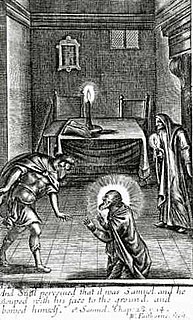
Necromancy is the practice of magic or black magic involving communication with the dead – either by summoning their spirits as apparitions, visions or raising them bodily – for the purpose of divination, imparting the means to foretell future events, discover hidden knowledge, to bring someone back from the dead, or to use the dead as a weapon. Sometimes referred to as "Death Magic", the term may also sometimes be used in a more general sense to refer to black magic or witchcraft.

The Ministry of Magic is the government of the Magical community of Britain in J. K. Rowling's Wizarding World, headed by an official entitled the Minister for Magic. The magical government in Britain is first mentioned in Harry Potter and the Philosopher's Stone; the Ministry makes its first proper appearance in Harry Potter and the Order of the Phoenix (2003). Throughout the books, it is regularly depicted as corrupt, elitist and completely incompetent, with its high-ranking officials blind to ominous events and unwilling to take action against threats to wizard society. Dolores Umbridge was placed at Hogwarts to see what was going on at the school and prevent the news that Lord Voldemort was back from spreading. It reaches a zenith of corruption before being effectively taken over by Voldemort. At the end of the final book, following Voldemort's death, Kingsley Shacklebolt takes over the ministry, changing it for the better. By the time of Harry Potter and the Cursed Child, Hermione Granger is the Minister for Magic.
Magical creatures are an aspect of the fictional wizarding world contained in the Harry Potter series and connected media, all created by British author J. K. Rowling. Throughout the seven main books of the series, Harry and his friends encounter many of these creatures on their adventures in Hogwarts, the Forbidden Forest, or other locations throughout the Wizarding World. In addition, students learn to take care of creatures such as Hippogriffs and Unicorns in the Care of Magical Creatures class at Hogwarts. Rowling has also written Fantastic Beasts and Where to Find Them, a guide to the magical beasts found in the series, and based on the fictional textbook of the same name written by Newt Scamander and used by students at Hogwarts. Many of these creatures are derived primarily from Greek mythology and other folklore, namely British and Scandinavian folklore. Many of the legends surrounding these mythical creatures are also incorporated in the books. "Children ... know that I didn't invent unicorns, but I've had to explain frequently that I didn't actually invent hippogriffs," Rowling told Stephen Fry in an interview for BBC Radio 4. "When I do use a creature that I know is a mythological entity, I like to find out as much as I can about it. I might not use it, but to make it as consistent as I feel is good for my plot."

The Dresden Files is a television series based on the fantasy book series of the same name by Jim Butcher. The series follows private investigator and wizard Harry Dresden, as he recounts investigations into supernatural disturbances in modern-day Chicago. It premiered January 21, 2007, on Sci Fi Channel in the United States and on Space in Canada. It was picked up by Sky One in the UK and began airing on February 14, 2007.
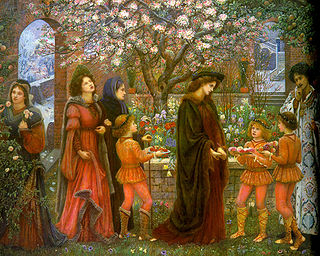
A magician, also known as a enchanter/enchantress, mage, magic-user, sorcerer/sorceress, spell-caster, warlock, witch, or wizard, is someone who uses or practices magic derived from supernatural, occult, or arcane sources. Magicians are common figures in works of fantasy, such as fantasy literature and role-playing games, and enjoy a rich history in mythology, legends, fiction, and folklore.
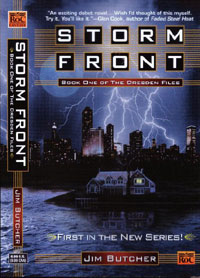
Storm Front is a 2000 fantasy novel by American writer Jim Butcher. It is the first novel in The Dresden Files, his first published series, and it follows the character of Harry Dresden, professional wizard. The novel was later adapted into a pilot for a SyFy channel television series.

Grave Peril is a 2001 urban fantasy novel by author Jim Butcher. It is the third novel in The Dresden Files, which follows the character of Harry Dresden, present-day Chicago's only professional wizard.

Small Favor is the tenth book in The Dresden Files, Jim Butcher's continuing series about wizard detective Harry Blackstone Copperfield Dresden. The book stayed on the New York Times Best Seller list for 3 weeks following its release, attaining the number 2 spot during its first week. Small Favor is available as an eBook and an audio CD (ISBN 0-14-314339-5).
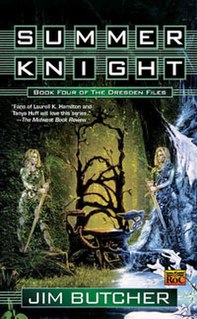
Summer Knight is a 2002 New York Times Bestselling contemporary fantasy novel by author Jim Butcher. It is the fourth novel in The Dresden Files, which follows the character of Harry Dresden, present-day Chicago's only professional wizard.
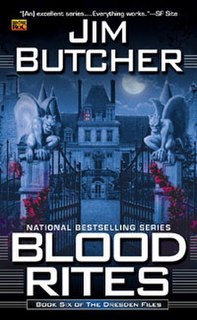
Blood Rites is the 6th book in The Dresden Files, Jim Butcher's continuing series about wizard detective Harry Blackstone Copperfield Dresden.

Dead Beat is the 7th book in The Dresden Files, Jim Butcher's continuing series about wizard detective Harry Dresden. It is available in print and e-book.

Proven Guilty is the 8th book in The Dresden Files, Jim Butcher's continuing series about wizard detective Harry Blackstone Copperfield Dresden. Proven Guilty had a release date of May 2, 2006.
In the universe of The Dresden Files, a series of fantasy/mystery novels written by Jim Butcher, each magical species has its own political and societal rules, and organizations. The human wizards depend on the White Council, while the vampires and faeries belong to various courts.

Turn Coat is the 11th book in The Dresden Files, Jim Butcher's continuing series about wizard detective Harry Dresden. It debuted at number one on the New York Times Best Seller list for hardcover fiction.

Various forms of witchcraft and divination are mentioned in the Hebrew Bible, generally in a disapproving tone.

Changes is the 12th book in The Dresden Files, Jim Butcher's continuing series about wizard detective Harry Blackstone Copperfield Dresden. Changes was released on April 6, 2010, and debuted at #1 on The New York Times Best Seller List for Hardcover Fiction, dropping to #3 in its second week on the list.
The Dresden Files is a series of contemporary fantasy/mystery novels written by American author Jim Butcher. The first novel, Storm Front, was published in 2000 by Roc Books.
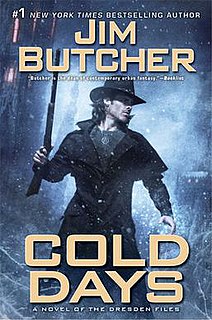
Cold Days is a 2012 bestselling novel by Jim Butcher and the 14th book in the ongoing The Dresden Files series. The book was first published on November 27, 2012 through Roc Hardcover and continues the adventures of wizard detective Harry Dresden.

Peace Talks is a novel in The Dresden Files series by Jim Butcher. It is the 16th novel in the series. It follows the protagonist, Harry Dresden as he attempts to navigate a convoluted peace negotiation between various supernatural powers.

Battle Ground is a novel by Jim Butcher and is the 17th novel in The Dresden Files. Battle Ground was published on September 29th, 2020 by Little, Brown Book Group. In it Harry Dresden, the protagonist, attempts to stop the Titan Ethniu from destroying Chicago. It will be followed by an 18th and 19th novel: Twelve Months and Mirror Mirror.
















